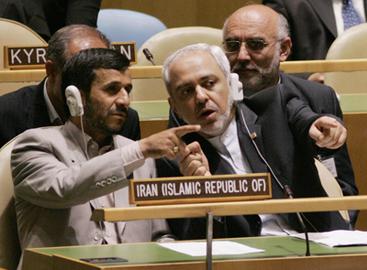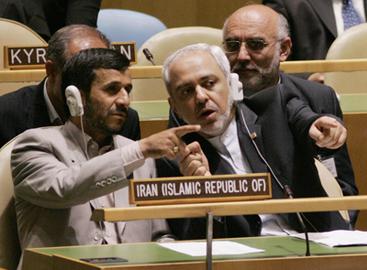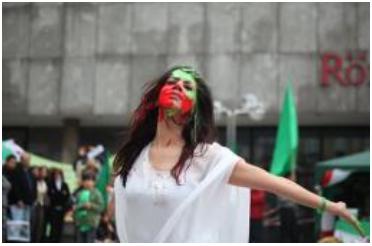
Genuine insight into Iran's political is notoriously difficult to glean, but the memoirs of Mohammad Javad Zarif, Iran's much vaunted and discussed foreign minister, offer rich insight into the personal life and political worldview of the man arguably poised to be the Islamic Republic's most significant envoy to the world since 1979. The memoir, entitled “Mr. Ambassador,” spans much of Zarif's life, from his upbringing in a religiously strict family to his early years serving at Iran's mission to the United Nations in New York.
The second part of the book deals closely with Zarif's long years living and working in the United States, a time in which he forged rare contacts with American politicians as well prominent academics. His views in this era are revelatory about his attitudes toward the West, and are peppered with arguments and critique about what he calls the “system of domination.”
While many prominent American journalists and foreign policy figures that Zarif interacted with during his years in New York recall the diplomat's gracious dinner parties, the friendliness of his wife, and a long-running charm offensive that made the Zarifs one of the most sought after guests in Manhattan, Zarif recounts his early diplomatic years in America as a time of social and professional isolation:
"I never truly integrated myself into the American society... We were not going to Americans’ houses. For instance, my niece who is very religious and has lived her whole life in America knows the English name of all the spices but my wife doesn’t, since my wife hadn’t interacted with our American neighbors or talked with American ladies about spices and foods... I don’t want to exaggerate this sensibility, but that wasn't my own preference either... At the beginning of our marriage, my wife had very strong revolutionary tendencies that were to some extent inflexible. We didn’t even have a TV set at home because my wife was against it. I had to beg her for quite a while before I finally bought a broken TV to watch news channels."
In those years, Zarif recounts how he not only kept his distance from the West and Americans in his home sphere, but was obliged to endure that same distance in the corridors of the United Nations. “During the Iran-Iraq war, we were exceedingly isolated within the United Nations. The other diplomats were not even willing to drink tea with us in salons or corridors.”
The diplomatic maneuvering and tensions that Zarif faced during that era were enormous, as the United Nations pondered how to respond to various stages of the Iran-Iraq War, and the Iranian mission at the U.N., marginalized, awaited instructions from Tehran, where the real decisions were being made. In 1982, Zarif writes, the Security Council invited the Iranian delegation to a session after the Iranian army regained the border city of Khorramshahr. Iran's then ambassador, together with Zarif, boycotted the meeting, in protest of the Security Council's foot dragging, and the age old problem of not having a clear mandate to negotiate. “No clear decision had been made regarding the issue inside Iran and we did not know what to say at the Security Council.” The Iranians went on to boycott UNSC sessions, Zarif says, for the next six years, and Iran's ambassador only attended the Security Council when Palestine or Afghanistan were under discussion. In time, the strategy of boycotting the Security Council became clearly costly and ineffective for Iran, as the council began weighing international sanctions, and in an eery manner the evokes more recent dynamics, Ayatollah Khomeini agreed in Tehran that the foreign ministry should ease its defiance of the United States as a mean of avoiding sanctions. On the eve of the war's resolution, Iran took a midway position of ‘neither rejection, nor acceptance’ on resolution 598, and Javad Larijani, appointed as Iran’s chief negotiator, used a “delaying strategy in forwarding the negotiation process."
Zarif’s first experience in cooperating with the Americans occurred almost simultaneously when he became involved in negotiations to secure the release of U.S. hostages held in Lebanon. Zarif traveled to the Iranian Embassy in Damascus to work with the UN Secretary General's Special Representative, and in the end, Iran fulfilled its promise: "The eight American hostages in Lebanon were released." But in return, the Americans informed the Iranians that “because of their presidential campaign issues, they couldn’t possibly make their promised reciprocal goodwill gesture [despite Iran’s contribution for releasing hostages]. President Bush had made that statement in one of his speeches.”
The memoir's tone is even throughout, with little tendency toward self-inflation, as in the anecdote Zarif describes about his work helping the Europeans and the Americans resolve serious differences in the drafting of the Statute of the International Criminal Court in 1992. At the time Zarif was serving as chairman of the United Nations General Assembly Legal Committee, and worked diligently to push the draft through. He writes dryly: “The US ambassador told me, 'If officials in Washington knew that the Iranian ambassador is mediating between us and our closest allies, they would commit suicide I presume.”
His track record as one of the lone Iranian diplomats who had dealt closely with American officials in the late 1980s and early 1990s made him the focal point for the Islamic Republic's contact with Washington. After returning to Iran, Zarif remained responsible for Tehran's contact with the United States, primarily through writing terse letters sent via the Swiss Embassy in Tehran. The tone of the missives was rather sharp, as Zarif staked out a tough response to U.S. allegations of Iranian involvement in a string of acts of international terrorism, from the 1992 bombing of the Israeli Embassy in Buenos Aires to the 1996 bombing of the Khobar towers in Saudi Arabia, to the Mykonos restaurant assassinations in September 1992. “We wanted to prevent the cases from turning into military threats against Iran,” he writes.
Zarif kept up his mission of staving off international censure of Iran, even as opinion turned against him in Tehran with the election of Mahmoud Ahmadinejad. Of that time, Zarif writes, “I had almost nothing to do with what was happening inside Iran. I was an ambassador who was imposed upon the new president.” His role in those years shifted from diplomacy to damage control, with hours of each week spent giving speeches defending Iran's peaceful right to enrich uranium and denying ambitions of weaponization. He made so many speeches, he said, that the head of Columbia University's International Affairs program jokingly asked Zarif if he was running for presidency of the United States. Then Foreign Minister Manouchehr Mottaki supported his efforts and secured resources for various public relations initiative.
But alongside all his soft diplomatic efforts to secure American goodwill and trust, Zarif argues that West remains a “system of domination” with neo-imperial intentions, and he views the history of Iran-US discord in the context of late twentieth century history. He describes how a strain of the American political establishment, in the wake of the Soviet Union's fall, sought out a new enemy to justify US superpower hegemony in the world. Revolutionary or political Islam offered up a new green terror to replace the red Soviet threat, and this threat, he argues, required the presence of a looming nuclear threat. Hyping Iran's nuclear program as threat to global security, he says, achieved much for the United States: “I basically believe that dragging the Iranian nuclear issue into the international politics was to prevent Iranian influence from growing further.”
That Iranian influence emerges from money Iran spent in supporting the Iraq opposition to Saddam Hussein, the Afghan Mujaheddin fighting the Soviets in Afghanistan – a backing in which Iranian and American interests aligned -- and groups like Hezbollah and Hamas at specific times “All of those expenses have shaped our pillars of power in the region,” Zarif writes.
One of the most perplexing strands of the memoir lies in Zarif's treatment of America. While he outlines the need for cooperation and has become the spearhead of Iranian public diplomacy in recent months, his views in the book strike a different tone, suggesting a pessimism and aversion to rapprochement with America. “Direct engagement with America is not going to solve our problems,” he writes, arguing lucidly that the nuclear issue is merely a flashpoint for a far wider American enmity with Iran, an enmity invested in limiting the Islamic Republic's regional influence and role. “Since [the revolution], America has tried to depict Iran as a threat to the international peace and security. The main idea behind such domination is to introduce its own enemies as the enemies of all.”
While the memoir is filled with light references to casual exchanges with Americans, Zarif also singles out other international diplomats who he feels simply fallen into stride with Washington. The current assistant to UN Security General Ban Ki-moon, he recalls, was president of the General Assembly when the body passed Iran's resolution on dialogue among civilizations, which Zarif authored and negotiated. The Americans managed to shrink down two days of planned review of the resolution to half a day, under the GA presidency of a Korean diplomat who is currently assistant to the Secretary General. “He earned his current reputation for complaisance at that time,” Zarif says, also noting that he feels similar toward Ban Ki-moon, who “leans too much toward the West.”
Of the differences between American leadership under George W. Bush and President Barack Obama, Zarif sees both leaders in pursuit of American hegemony but through different means. Bush tread this path through “militarism and unilateralism” while President Obama pursues the same by promoting “value-based norm making and multilateralism.”
What is most striking about Zarif's memoir in Persian is his deftly-articulated case for countering such American's new approach with Iran's own brand of values-based diplomacy, which he says is “equal to the issue of exporting the revolution and revolutionary culture.” He makes that case that not only is “values-based diplomacy not detrimental to our national interest and national security, but I believe is complementary.” By maintaing its ideals and exercising flexibility Iran can become a serious regional and world player, with positions that are deemed logical and acceptable.
Emerging out of this perspective is something of a handbook for the successful Iranian diplomat in deploying foreign policy. “We should strive to present the values of the Islamic Republic as recognized and accepted norms,” he says. Both Ayatollahs Khomeini and Khamenei have repeated that exporting revolution doesn't mean using tanks and guns, but extending values, he notes, and those values are key to Iran's ambitions. “Without [our revolutionary goals] we would ultimately become a country like Pakistan at the most.”
The memoir concludes by invoking the figure of “Haji Washington,” the protagonist in an Iranian film that deals with the life of Iran's first ever ambassador to the Washington, Haji Hossain-Gholi Khan, Motamed ol Vezareh, during the late nineteenth century. The film depicts Haji Washington’s painful ignorance of America's social and political milieu, and his eventual return from New York filled with political frustration and failure.
But Zarif doesn’t consider himself another Haji Washington. That bumbling fate he reserves for Iran's twentieth century diplomats, who lacked national confidence and self-esteem. Post-revolutions diplomats have mostly fared better in Zarif's eyes. “I lived in America for 30 years but managed to preserve my own Iranian and Islamic traditions and customs,” he says. “Western culture still feels alien to me.”
The Islamic Republic's diplomats have religious considerations in mind during diplomatic meetings, he reminds his readers. “I don’t remember if Haji Washington had ever respected those considerations or not! You do not drink alcohol, do not eat meat that isn't halal meat and do not shake hands with a namahram (non-relative) woman.”
What Zarif doesn't address, in the end, is what an Iranian diplomat should do when diplomacy and such considerations collide. It is a consideration that goes to the very heart of Zarif's vision for Iranian foreign policy in the twenty-first century. If Iran is to embrace flexibility and present its revolutionary values as rational, how can its diplomats then refuse to attend functions where alcohol is served, when the envoys of regional rivals like Saudi Arabia turn up, promote their nations, and simply drink juice? Should the “successful Iranian diplomat” also not then attend such functions and make the cause for the Islamic Republic's 'value-based norms' with a glass of water in his hand? Or should he creep back to an empty hotel room?
His own path of resistance, he says, is different than that of leftist Islamists and radical Islamic fundamentalists: "if you are intended to confront the system of domination, you should try to disrupt the basis of domination... Since the beginning of the Islamic revolution, the US policy has been based upon trapping Iran by imposing sanctions... Americans tried their best both in hostage taking incident and the Iran-Iraq [war] but failed to achieve their goal."
visit the accountability section
In this section of Iran Wire, you can contact the officials and launch your campaign for various problems

























comments